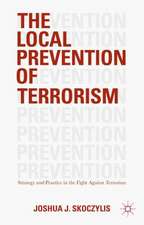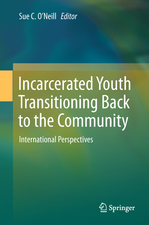Criminal Justice and Mental Health: An Overview for Students
Autor Jada Hector, David Kheyen Limba Engleză Hardback – 9 oct 2022
In the United States, the law enforcement and the criminal justice system is often the first public service to be in contact with individuals suffering from mental illness or in mental distress. Those with untreated mental illnesses are often at higher risk for committing criminal acts, and due to a lack of mental health facilities, resources, and pervasive misconceptions about this population, those with mental illness often end up in the corrections system. This timely work covers the roles of each part of the criminal justice system interacting with mentally ill individuals, from law enforcement and first responders, social services, public health services, sentencing and corrections, to release and re-entry. It also addresses the crucial need of mental healthcare for criminal justice professionals, who suffer from high rates of job stress, PTSD, and other mental health issues.
With new chapters on stigma, mental illness during and after disaster and crisis, and updates and new supplementary materials throughout, this book will be of interest to students of criminology and criminal justice, sociology, psychology, and public health. It will also be of interest to policy-makers and practitioners already working in the field, interacting with and addressing the needs of mentally ill individuals.
| Toate formatele și edițiile | Preț | Express |
|---|---|---|
| Paperback (2) | 386.22 lei 6-8 săpt. | |
| Springer International Publishing – 10 oct 2023 | 386.22 lei 6-8 săpt. | |
| Springer International Publishing – 30 ian 2019 | 581.14 lei 6-8 săpt. | |
| Hardback (2) | 393.52 lei 6-8 săpt. | |
| Springer International Publishing – 9 oct 2022 | 393.52 lei 6-8 săpt. | |
| Springer International Publishing – 27 apr 2018 | 730.02 lei 6-8 săpt. |
Preț: 393.52 lei
Nou
Puncte Express: 590
Preț estimativ în valută:
75.32€ • 81.85$ • 63.31£
75.32€ • 81.85$ • 63.31£
Carte tipărită la comandă
Livrare economică 21 aprilie-05 mai
Preluare comenzi: 021 569.72.76
Specificații
ISBN-13: 9783031153372
ISBN-10: 3031153375
Pagini: 251
Ilustrații: XII, 251 p. 4 illus.
Dimensiuni: 155 x 235 mm
Greutate: 0.54 kg
Ediția:2nd ed. 2022
Editura: Springer International Publishing
Colecția Springer
Locul publicării:Cham, Switzerland
ISBN-10: 3031153375
Pagini: 251
Ilustrații: XII, 251 p. 4 illus.
Dimensiuni: 155 x 235 mm
Greutate: 0.54 kg
Ediția:2nd ed. 2022
Editura: Springer International Publishing
Colecția Springer
Locul publicării:Cham, Switzerland
Cuprins
Chapter 1. Mental Illness, Then and Now.- Chapter 2. Stigma.- Chapter 3. Size and Scope of Justice-Involved Mental Illness.- Chapter 4. Mental Illness during and after Disaster and Crisis.- Chapter 5. The Front Line: EMS, Law Enforcement, and Probation and Parole.- Chapter 6. Treatment: Intersection with Criminal Justice.
Notă biografică
Jada N. Hector is an accomplished mental health clinician with an array of experience from treating severe mental illness, trauma, substance use and abuse, to everyday mental health struggles shared by Americans and their loved ones. These days, Ms. Hector lends those experiences to help local and state governments remedy gaps in mental health surveillance, treatment, and recovery options, create better policy, and heal communities. Ms. Hector is a graduate of the Louisiana State University with a masters degree in Counseling and is a Licensed Professional Counselor in the state of Louisiana. She also attended B.I. Moody III College of Business Administration at the University of Louisiana at Lafayette where she earned an undergraduate degree in business with a concentration in marketing.
David N. Khey has focused his research on a few areas in criminology, criminal justice, and forensic science. In particular, he is currently investigating mental health policy, drug policy, control, toxicology, chemistry, and addiction, as well as the changing evidentiary power of forensic science technologies. Born and raised in South Florida during the late 1970s and early 80s, drug policy and enforcement quickly piqued his interest. In this topical area, Dr. Khey has presented research on drug and alcohol use/abuse and provided policy analysis to local and state officials in Florida. A highlight of this work includes an invitation to address the Governor's Office Drug Policy Advisory Council in 2007. Soon after moving to Louisiana at a time when divestments in mental health services were at its modern day peak, mental health policy quickly became one of his key areas of focus and remains that way to this day. Dr. Khey holds advanced degree in pharmacy and pharmaceutical sciences with a concentration in forensic drug chemistry and doctorate in criminology, law, and society from the University of Florida.
David N. Khey has focused his research on a few areas in criminology, criminal justice, and forensic science. In particular, he is currently investigating mental health policy, drug policy, control, toxicology, chemistry, and addiction, as well as the changing evidentiary power of forensic science technologies. Born and raised in South Florida during the late 1970s and early 80s, drug policy and enforcement quickly piqued his interest. In this topical area, Dr. Khey has presented research on drug and alcohol use/abuse and provided policy analysis to local and state officials in Florida. A highlight of this work includes an invitation to address the Governor's Office Drug Policy Advisory Council in 2007. Soon after moving to Louisiana at a time when divestments in mental health services were at its modern day peak, mental health policy quickly became one of his key areas of focus and remains that way to this day. Dr. Khey holds advanced degree in pharmacy and pharmaceutical sciences with a concentration in forensic drug chemistry and doctorate in criminology, law, and society from the University of Florida.
Textul de pe ultima copertă
This textbook provides an overview of the overlap between the criminal justice system and mental health for students of criminology and criminal justice. It provides an accessible overview of basic signs and symptoms of major mental illnesses and size of scope of justice-involved individuals with mental illness.
In the United States, the law enforcement and the criminal justice system is often the first public service to be in contact with individuals suffering from mental illness or in mental distress. Those with untreated mental illnesses are often at higher risk for committing criminal acts, and due to a lack of mental health facilities, resources, and pervasive misconceptions about this population, those with mental illness often end up in the corrections system. This timely work covers the roles of each part of the criminal justice system interacting with mentally ill individuals, from law enforcement and first responders, social services, public health services, sentencing andcorrections, to release and re-entry. It also addresses the crucial need of mental healthcare for criminal justice professionals, who suffer from high rates of job stress, PTSD, and other mental health issues.
With new chapters on stigma, mental illness during and after disaster and crisis, and updates and new supplementary materials throughout, this book will be of interest to students of criminology and criminal justice, sociology, psychology, and public health. It will also be of interest to policy-makers and practitioners already working in the field, interacting with and addressing the needs of mentally ill individuals.
With new chapters on stigma, mental illness during and after disaster and crisis, and updates and new supplementary materials throughout, this book will be of interest to students of criminology and criminal justice, sociology, psychology, and public health. It will also be of interest to policy-makers and practitioners already working in the field, interacting with and addressing the needs of mentally ill individuals.
Caracteristici
Provides an accessible overview of mental health for criminal justice students Explores involvement of mental illness with each step of the criminal justice system Presents recommendations for mental health of criminal justice professionals



























